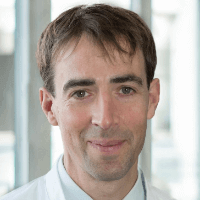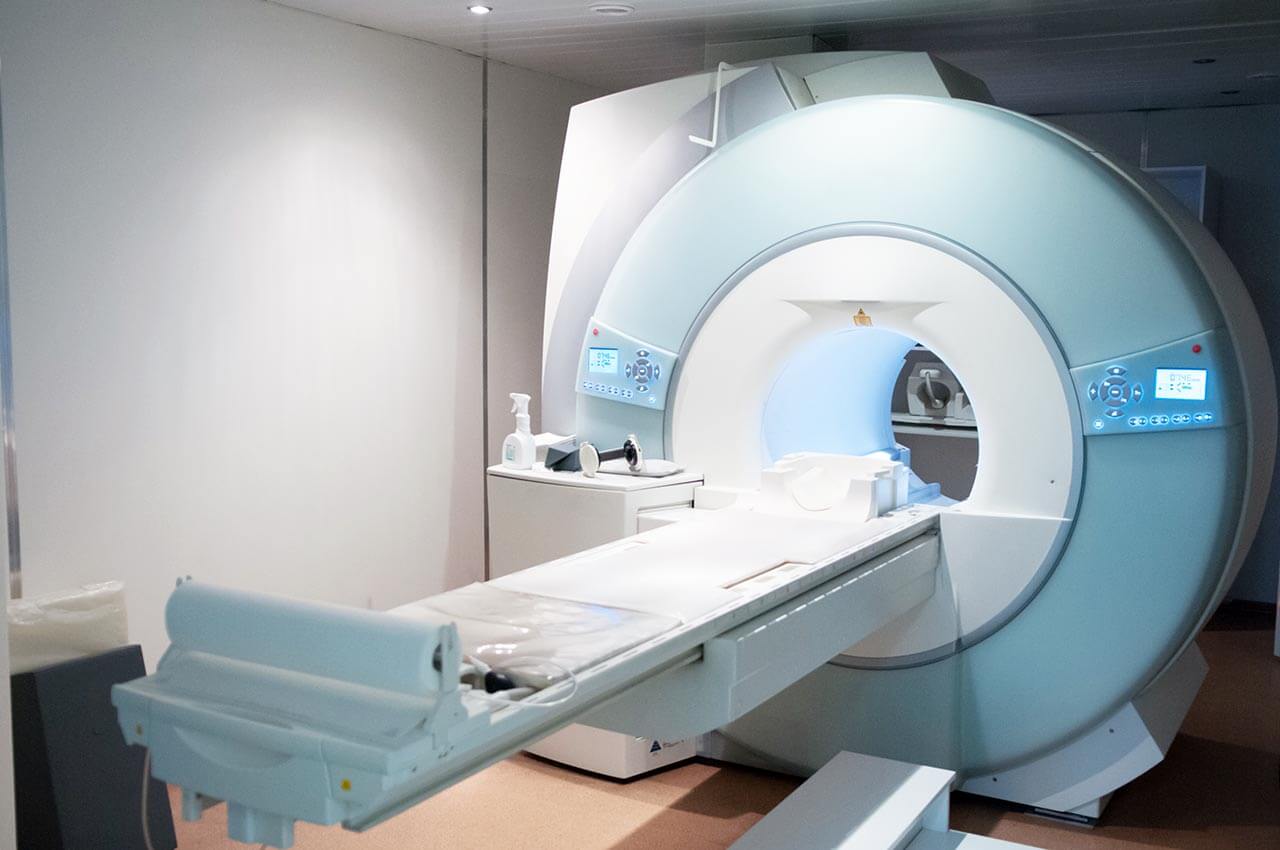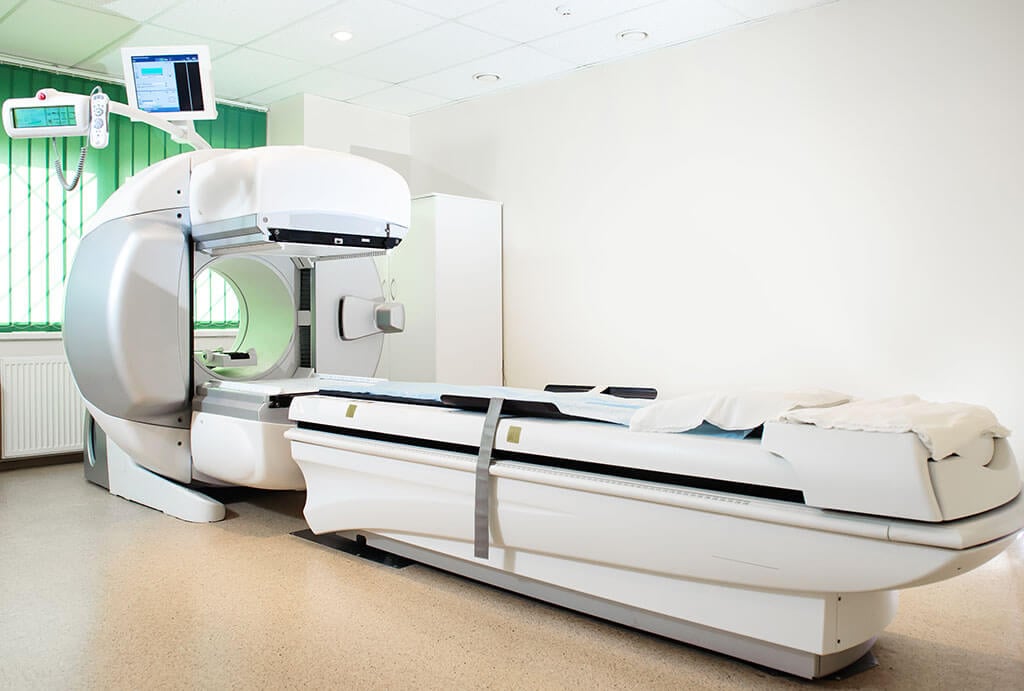
The program includes:
- Initial presentation in the clinic
- clinical history taking
- review of medical records
- physical examination
- laboratory tests:
- complete blood count
- biochemical blood analysis
- inflammation indicators (CRP, ESR)
- indicators of blood coagulation
- TSH-basal
- blood gas analysis
- chest x-ray examination
- bronchography
- high-resolution computed tomography (HRCT) (on indication 1200€)
- collected three sputum samples
- pulmonary function test
- bronchoscopy with biopsy
- histological and microbiological examination
- bronchial lavage
- consultation of related specialists
- symptomatic specific treatment
- the cost of essential medicines and materials
- nursing services
- control examinations
- full hospital accommodation
- developing of further guidance
Required documents
- Medical records
- Chest X-ray, MRI/CT scan (if available)
Service
You may also book:
 BookingHealth Price from:
BookingHealth Price from:
About the department
The Department of Pulmonology at the DKD HELIOS Clinic Wiesbaden offers the full range of medical services in the areas of its competence. The department's highly qualified doctors carry out a variety of diagnostic tests and therapeutic procedures for the patients with diseases of the lungs, bronchi, pleura and mediastinal organs. One of the key areas of the department's clinical practice is lung cancer treatment. Particular attention is also paid to the medical care for the patients with such chronic respiratory diseases as chronic obstructive pulmonary disease and pulmonary emphysema. The department's pulmonologists cooperate closely with thoracic surgeons, oncologists and other specialists from the related medical fields, thanks to which patients benefit from a comprehensive and interdisciplinary approach to treatment. The department's therapeutic offer includes drug therapy with the latest generation medicines and endoscopic interventional procedures that allow avoiding open surgery. During both diagnostic and therapeutic procedures, the department's specialists observe modern clinical protocols, thanks to which the patient safety is at the highest level. The Chief Physician of the department is Prof. Dr. med. Tim Hirche.
The primary focus of the department's clinical activities is the diagnostics and treatment of lung tumors. The department's doctors have a wide range of diagnostic methods for assessing the condition of the lungs. These are laboratory tests, radiography, computed tomography, bronchoscopy, etc. Small benign tumors are removed endoscopically. Should cancer be confirmed, oncologists, thoracic surgeons, radiologists and other specialists will be necessarily involved in the therapeutic process. They cooperatively study the patient's diagnostic results and develop an optimal treatment regimen for a complete cure or a long-term remission. At the initial stages of lung cancer, the department's specialists most often perform endoscopic removal of the tumor or, in cooperation with thoracic surgeons, perform minimally invasive interventions. The surgery is usually complemented by chemotherapy and radiation therapy. At the advanced stages of lung cancer, surgical treatment is ineffective, and therefore chemotherapy and irradiation become the main therapeutic methods. The department also provides innovative immunotherapy, the essence of which is the targeted effect of drugs on the patient's immune system. The drugs activate the patient's immune system allowing it to detect and destroy cancer cells. The impressive clinical experience of the department's pulmonologists and the availability of state-of-the-art equipment make it possible to successfully treat patients with oncology of varying severity.
The treatment of chronic obstructive pulmonary disease (COPD) is of particular interest to the department's medical team. The pathology is characterized by a chronic limitation of air movement in the respiratory tract. As the disease progresses, symptoms worsen, up to the onset of shortness of breath at rest. To confirm the diagnosis, spirometry is usually used. It allows assessing respiration rate and volume. Chronic obstructive pulmonary disease (COPD) is incurable, but the doctors have excellent options for alleviating symptoms, increasing a patient's physical stamina and improving his quality of life. The initial stages of COPD can be controlled by drug therapy and smoking cessation, if the patient has such a bad habit. Complicated COPD often requires oxygen therapy. The last-line treatment is an endoscopic procedure for lung volume reduction. However, this type of therapy is only used in the most complex clinical cases.
The department's specialists also provide effective treatment for the patients suffering from pulmonary emphysema. The disease develops due to morphological changes in lung tissue and impaired gas exchange in them. The diagnostics involves the use of both laboratory and instrumental methods. If the diagnostic examination confirms the presence of pulmonary emphysema, the next step will be treatment tactics planning. The first step in the therapeutic process is to quit smoking, if the patient has such a bad habit. The basic treatment is drug therapy.
The department specializes in the diagnostics and treatment of the following diseases:
- Chronic cough
- Bronchitis and chronic obstructive pulmonary disease (COPD)
- Bronchial asthma
- Pulmonary emphysema
- Pulmonary fibrosis
- Pulmonary hypertension
- Allergic alveolitis
- Sarcoidosis
- Occupational lung diseases (for example, asbestosis, silicosis)
- Pathological pulmonary lesions caused by systemic diseases (for example, collagenosis, rheumatic diseases)
- Benign and malignant lung tumors
- Infectious lung diseases (such as pneumonia and tuberculosis)
- Rare lung diseases (for example, cystic fibrosis, ciliary dyskinesia, alpha-1 antitrypsin deficiency, histiocytosis X)
- Rejection reactions after transplantation (for example, after bone marrow transplantation)
- Pleurisy of various etiology
- Other lung diseases
The department's diagnostic and therapeutic options include:
- Diagnostics
- Pulmonary function testing
- Assessment of blood oxygen levels
- Measurement of the diffusing capacity of the lungs
- Blood gas test
- Exhaled nitric oxide level test
- Tests with stress and assessment of blood oxygen levels
- Ultrasound scanning of the lungs and other thoracic organs
- Allergic tests (for example, in case of suspected allergic rhinitis, allergic bronchial asthma, etc.)
- Respiratory polygraphy for suspected obstructive sleep apnea
- Diagnostic bronchoscopy
- Resting ECG
- Treatment
- Drug therapy
- Therapeutic bronchoscopy
- Removal of foreign bodies
- Stent implantation in case of airway stenosis
- Pus and mucus removal from the trachea and bronchi
- Removal of small lung tumors
- Argon plasma coagulation
- Weaning from mechanical ventilation
- Other medical services
Curriculum vitae
Higher Education
- 1993 - 1999 Study of Human Medicine, Johann Wolfgang Goethe University of Frankfurt.
- 07.1996 - 07.1997 Study of Human Medicine, Claude Bernard University Lyon 1, France.
- 10.1998 - 02.1999 One-year internship, University of Oxford, England.
- 02.1999 - 06.1999 One-year internship, University of the Free State, South Africa.
Professional Career
- 11.1999 - 06.2008 Physician in the Department of Pulmonology and Allergology, University Hospital Frankfurt am Main.
- 04.2002 - 09.2004 Postdoctoral Fellow, Department of Pulmonology and Intensive Care, University of Washington School of Medicine, St. Louis, USA.
- 06.2008 - 06.2009 Senior Physician in the Department of Pulmonology and Allergology, University Hospital Frankfurt am Main.
- 03.2009 Habilitation and lecturing, Johann Wolfgang Goethe University of Frankfurt.
- Since 07.2009 Chief Physician of the Department of Pulmonology at the DKD HELIOS Clinic Wiesbaden.
Scholarships, Awards and Other Honors
- 07.1996 - 07.1997 Scholarship of the Carl Duisberg Society for Medical Studies at the Claude Bernard University Lyon 1, Lyon, France.
- 10.1998 - 02.1999 Green College Scholarship, Oxford University Medical School for Medical Studies at the University of Oxford, Oxford, England.
- 02.1999 - 06.1999 Scholarship of the German Academic Exchange Service (DAAD) for Medical Studies at the University of the Free State, South Africa.
- 04.2002 - 03.2003 Scholarship of the German Academic Exchange Service (DAAD) for Medical Studies at the Washington University, St. Louis, USA.
- 04.2003 - 09.2004 Research Scholarship of the Christiane Herzog Foundation at the Washington University, St. Louis, USA.
- 06.2005 Encouraging Award of the Johann Wolfgang Goethe University of Frankfurt for Young Investigators.
Photo of the doctor: (c) DKD Helios Klinik Wiesbaden
About hospital
The DKD HELIOS Clinic Wiesbaden has long made a name for itself in the international medical arena by introducing an optimal model of medical care, combining the use of the most advanced medical technologies, the experience of highly qualified doctors and impeccable quality of patient care. The medical facility first opened its doors to patients in 1970. The world famous Mayo Clinic Rochester in America served as a model for the design of the medical complex. Since the foundation of the clinic, the main direction of its activities has been comprehensive diagnostics of complex diseases integrated into an interdisciplinary treatment concept. Today, an integral part of clinical practice is also preventive diagnostics aimed at the early detection of pathological changes in the human body. In recent years, the clinic has been actively developing the direction of surgery, in which it has significantly succeeded. The clinic enjoys a reputation as one of the best medical facilities in Europe in the field of endocrine and colorectal surgery, as well as in hernia repair surgery.
The clinic has 24 specialized departments. Each of them offers a team of experienced doctors, whose main value is the patient's health. The work of all doctors of the medical facility is based on a single credo – "Treat not a disease, but a patient". According to this belief, the course of treatment should be as individual as possible, taking into account the patient's physical characteristics, lifestyle, diet, emotional state, etc.
The clinic's bed capacity consists of 138 inpatient beds and 60 beds in a day hospital. Many diagnostic and therapeutic procedures are performed on an outpatient basis. The diagnostic and treatment rooms, like the operating rooms of the clinic, are equipped with state-of-the-art technology to ensure the observance of strict hygiene and safety standards. The advanced medical equipment allows detecting the slightest changes in the functioning of organs and their structure with impeccable accuracy, thanks to which doctors can diagnose complex pathologies at the very early stages. This greatly increases the chances of a successful cure.
The location of the clinic in Wiesbaden, known as one of the oldest thermal spas in Europe, is another pleasant advantage for the patients. Arriving at the clinic for a preventive diagnostic examination, one can improve his health in the healing thermal springs, as well as enjoy the sightseeing of historical monuments. The medical center is located in the immediate vicinity of the English style Spa Park founded in the distant 1852, so in the free time from medical procedures one can take a pleasant walk in the beautiful park.
Photo: (с) depositphotos
Accommodation in hospital
Patients rooms
The patients of the DKD HELIOS Clinic Wiesbaden live in comfortable single and double rooms. Each patient room has an ensuite bathroom with shower and toilet. The standard patient room furnishings include an automatically adjustable bed, a bedside table, a table and chairs, a TV and a telephone.
The clinic also offers enhanced comfort rooms with spacious bathrooms, which additionally include a large mirror, hairdryer, changeable towels and toiletries. These patient rooms also have a safe for storing valuables, a free minibar with soft drinks, a flat-screen TV with satellite channels and free Wi-Fi.
Meals and Menus
The patients of the clinic are offered tasty and balanced three meals a day: breakfast, lunch and dinner. If for some reason you do not eat all the foods, you will be offered an individual menu. Please inform the medical staff about your dietary preferences prior to treatment.
The clinic also has a cozy cafe where one can taste delicious snacks, salads, main courses and desserts. One can also enjoy aromatic coffee, delicious tea and soft drinks in the cafe.
Further details
Standard rooms include:
Religion
The religious services are available upon request.
Accompanying person
During the inpatient program, the accompanying person can live with the patient in a patient room or a hotel of his choice. Our managers will help you choose the most suitable option.
Hotel
During the outpatient program, the patient can stay at the hotel of his choice. Our managers will help you choose the most suitable option.





